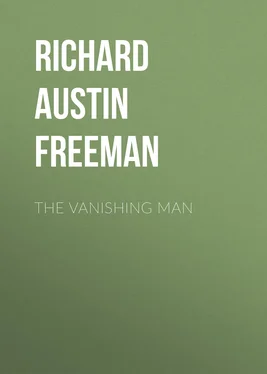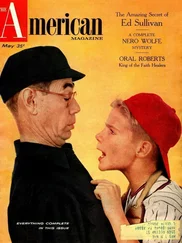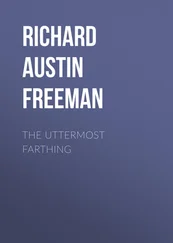Richard Austin Freeman - The Vanishing Man
Здесь есть возможность читать онлайн «Richard Austin Freeman - The Vanishing Man» — ознакомительный отрывок электронной книги совершенно бесплатно, а после прочтения отрывка купить полную версию. В некоторых случаях можно слушать аудио, скачать через торрент в формате fb2 и присутствует краткое содержание. Жанр: foreign_prose, Классический детектив, foreign_detective, foreign_antique, на английском языке. Описание произведения, (предисловие) а так же отзывы посетителей доступны на портале библиотеки ЛибКат.
- Название:The Vanishing Man
- Автор:
- Жанр:
- Год:неизвестен
- ISBN:нет данных
- Рейтинг книги:3 / 5. Голосов: 1
-
Избранное:Добавить в избранное
- Отзывы:
-
Ваша оценка:
- 60
- 1
- 2
- 3
- 4
- 5
The Vanishing Man: краткое содержание, описание и аннотация
Предлагаем к чтению аннотацию, описание, краткое содержание или предисловие (зависит от того, что написал сам автор книги «The Vanishing Man»). Если вы не нашли необходимую информацию о книге — напишите в комментариях, мы постараемся отыскать её.
The Vanishing Man — читать онлайн ознакомительный отрывок
Ниже представлен текст книги, разбитый по страницам. Система сохранения места последней прочитанной страницы, позволяет с удобством читать онлайн бесплатно книгу «The Vanishing Man», без необходимости каждый раз заново искать на чём Вы остановились. Поставьте закладку, и сможете в любой момент перейти на страницу, на которой закончили чтение.
Интервал:
Закладка:
The little man smiled a quaint, crinkly smile of gratification as he explained:
"I happened to look out of the laboratory window as you turned the corner, sir."
"How disappointingly simple," said Jervis. "We were hoping for something abstruse and telepathic."
"Simplicity is the soul of efficiency, sir," replied Polton as he checked the tea-service to make sure that nothing was forgotten, and with this remarkable aphorism he silently evaporated.
"To return to the Bellingham case," said Thorndyke, when he had poured out the tea. "Have you picked up any facts relating to the parties—any facts, I mean, of course, that it would be proper for you to mention?"
"I have learned one or two things that there is no harm in repeating. For instance, I gather that Godfrey Bellingham—my patient—lost all his property quite suddenly about the time of the disappearance."
"That is really odd," said Thorndyke. "The opposite condition would be quite understandable, but one doesn't see exactly how this can have happened, unless there was an allowance of some sort."
"No, that was what struck me. But there seem to be some queer features in the case, and the legal position is evidently getting complicated. There is a will, for example, which is giving trouble."
"They will hardly be able to administer the will without either proof or presumption of death," Thorndyke remarked.
"Exactly. That's one of the difficulties. Another is that there seems to be some fatal defect in the drafting of the will itself. I don't know what it is, but I expect I shall hear sooner or later. By the way, I mentioned the interest that you had taken in the case, and I think Bellingham would have liked to consult you, but, of course, the poor devil has no money."
"That is awkward for him if the other interested parties have. There will probably be legal proceedings of some kind, and as the law takes no account of poverty, he is likely to go to the wall. He ought to have advice of some sort."
"I don't see how he is to get it," said I.
"Neither do I," Thorndyke admitted. "There are no hospitals for impecunious litigants; it is assumed that only persons of means have a right to go to law. Of course, if we knew the man and the circumstances we might be able to help him; but, for all we know to the contrary, he may be an arrant scoundrel."
I recalled the strange conversation that I had overheard, and wondered what Thorndyke would have thought of it if it had been allowable for me to repeat it. Obviously it was not, however, and I could only give my own impressions.
"He doesn't strike me as that," I said; "but, of course, one never knows. Personally, he impressed me rather favourably, which is more than the other man did."
"What other man?" asked Thorndyke.
"There was another man in the case, wasn't there? I forget his name. I saw him at the house and didn't much like the look of him. I suspect he's putting some sort of pressure on Bellingham."
"Berkeley knows more about this than he is telling us," said Jervis. "Let us look up the report and see who this stranger is." He took down from a shelf a large volume of newspaper-cuttings and laid it on the table.
"You see," said he, as he ran his finger down the index, "Thorndyke files all the cases that are likely to come to something, and I know he had expectations respecting this one. I fancy he had some ghoulish hope that the missing gentleman's head might turn up in somebody's dust-bin. Here we are; the other man's name is Hurst. He is apparently a cousin, and it was at his house that the missing man was last seen alive."
"So you think Mr. Hurst is moving in the matter?" said Thorndyke, when he had glanced over the report.
"That is my impression," I replied, "though I really know nothing about it."
"Well," said Thorndyke, "if you should learn what is being done and should have permission to speak of it, I shall be very interested to hear how the case progresses; and if an unofficial opinion on any point would be of service, I think there would be no harm in my giving it."
"It would certainly be of great value if the other parties are taking professional advice," I said; and then, after a pause, I asked: "Have you given this case much consideration?"
Thorndyke reflected. "No," he said, "I can't say that I have. I turned it over rather carefully when the report first appeared, and I have speculated on it occasionally since. It is my habit, as Jervis was telling you, to utilise odd moments of leisure (such as a railway journey, for instance) by constructing theories to account for the facts of such obscure cases as have come to my notice. It is a useful habit, I think, for, apart from the mental exercise and experience that one gains from it, an appreciable proportion of these cases ultimately come into my hands, and then the previous consideration of them is so much time gained."
"Have you formed any theory to account for the facts in this case?" I asked.
"Yes; I have several theories, one of which I especially favour, and I am waiting with great interest such new facts as may indicate to me which of these theories is probably the correct one."
"It's no use your trying to pump him, Berkeley," said Jervis. "He is fitted with an information-valve that opens inwards. You can pour in as much as you like, but you can't get any out."
Thorndyke chuckled. "My learned friend is, in the main, correct," he said. "You see, I may be called upon any day to advise on this case, in which event I should feel remarkably foolish if I had already expounded my views in detail. But I should like to hear what you and Jervis make of the case as reported in the newspapers."
"There now," exclaimed Jervis, "what did I tell you? He wants to suck our brains."
"As far as my brain is concerned," I said, "the process of suction isn't likely to yield much except a vacuum, so I will resign in favour of you. You are a full-blown lawyer, whereas I am only a simple G.P."
Jervis filled his pipe with deliberate care and lighted it. Then, blowing a slender stream of smoke into the air, he said:
"If you want to know what I make of the case from that report, I can tell you in one word—nothing. Every road seems to end in a cul-de-sac."
"Oh, come!" said Thorndyke, "this is mere laziness. Berkeley wants to witness a display of your forensic wisdom. A learned counsel may be in a fog—he very often is—but he doesn't state the fact baldly; he wraps it up in a decent verbal disguise. Tell us how you arrive at your conclusion. Show us that you have really weighed the facts."
"Very well," said Jervis, "I will give you a masterly analysis of the case—leading to nothing." He continued to puff at his pipe for a time with slight embarrassment, as I thought—and I fully sympathised with him. Finally he blew a little cloud and commenced:
"The position appears to be this: Here is a man who is seen to enter a certain house, who is shown into a certain room and shut in. He is not seen to come out, and yet, when the room is next entered, it is found to be empty; and that man is never seen again, alive or dead. That is a pretty tough beginning.
"Now, it is evident that one of three things must have happened. Either he must have remained in that room, or at least in that house, alive; or he must have died, naturally or otherwise, and his body have been concealed; or he must have left the house unobserved. Let us take the first case. This affair happened nearly two years ago. Now, he couldn't have remained alive in the house for two years. He would have been noticed. The servants, for instance, when cleaning out the rooms, would have observed him."
Here Thorndyke interposed with an indulgent smile at his junior: "My learned friend is treating the inquiry with unbecoming levity. We accept the conclusion that the man did not remain in the house alive."
Читать дальшеИнтервал:
Закладка:
Похожие книги на «The Vanishing Man»
Представляем Вашему вниманию похожие книги на «The Vanishing Man» списком для выбора. Мы отобрали схожую по названию и смыслу литературу в надежде предоставить читателям больше вариантов отыскать новые, интересные, ещё непрочитанные произведения.
Обсуждение, отзывы о книге «The Vanishing Man» и просто собственные мнения читателей. Оставьте ваши комментарии, напишите, что Вы думаете о произведении, его смысле или главных героях. Укажите что конкретно понравилось, а что нет, и почему Вы так считаете.












